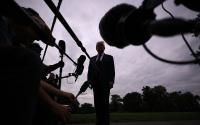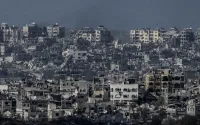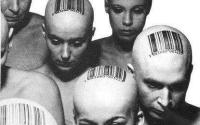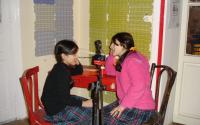Common Dreams / Published on Monday, January 20, 2003 by the New York TimesEditorial
A largely missing ingredient in the nascent debate about invading Iraq showed up on the streets of major cities over the weekend as crowds of peaceable protesters marched in a demand to be heard. They represented what appears to be a large segment of the American public that remains unconvinced that the Iraqi threat warrants the use of military force at this juncture.
Denouncing the war plan as an administration idée fixe that will undermine America's standing in the world, stir unrest in the Mideast and damage the American economy, the protesters in Washington massed on Saturday for what police described as the largest antiwar rally at the Capitol since the Vietnam era. It was impressive for the obvious mainstream roots of the marchers — from young college students to grayheads with vivid protest memories of the 60's. They gathered from near and far by the tens of thousands, galvanized by the possibility that President Bush will soon order American forces to attack Iraq even without the approval of the United Nations Security Council.
Mr. Bush and his war cabinet would be wise to see the demonstrators as a clear sign that noticeable numbers of Americans no longer feel obliged to salute the administration's plans because of the shock of Sept. 11 and that many harbor serious doubts about his march toward war. The protesters are raising some nuanced questions in the name of patriotism about the premises, cost and aftermath of the war the president is contemplating. Millions of Americans who did not march share the concerns and have yet to hear Mr. Bush make a persuasive case that combat operations are the only way to respond to Saddam Hussein.
Other protests will be emphasizing civil disobedience in the name of Martin Luther King Jr. But any graphic moments to come of confrontation and arrest should be seen in the far broader context of the Capitol scene: peaceable throngs of mainstream Americans came forward demanding more of a dialogue from political leaders. Mr. Bush and his aides, to their credit, welcomed the demonstrations as a healthy manifestation of American democracy at work. We hope that spirit will endure in the weeks ahead if differences deepen and a noisier antiwar movement develops. These protests are the tip of a far broader sense of concern and lack of confidence in the path to war that seems to lie ahead.






